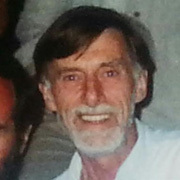
Brian Latham
— Mike O'Connor was working in television as a trainee camera operator in 1968 when he met Brian Latham in Wellington. They went on to work and flat together in Auckland. Here he writes about Brian's career.
Born and raised in England, Brian was a keen stills photographer who became a cameraman for the film unit of British aircraft company De Havilland. One project he worked on was filming the development of the Trident, the first T-tail rear-engined three-engined airliner.
Brian moved downunder to Wellington in the early 60s, and worked for a number of years at the National Film Unit. The unit was then part of the Tourist and Publicity department, which made films about various aspects of the New Zealand way of life. Brian travelled around the country and filmed a lot of places that most people could never see then. His NFU work included tourism short Good Times Two (1968) and sheep station short Wayleggo (1965).
A lot of the unit’s output was filmed in 35mm and shown as short films in cinemas, preceding the main feature. In the late 60s Brian joined the NZ Broadcasting Corporation's film unit in Wellington, before transferring to the NZBC's Auckland office, where he would spend many years. As a staff film cameraman, he worked on news and current affairs, sports, documentaries and drama.
He was a cinematographer on Pukemanu— often described as New Zealand's first genuinely indigenous local drama — and shot for probation service drama Section 7, as well as Country Calendar and talent show Studio One.
Scenes set inside were mostly recorded on videotape in the studio. All the exteriors and locations were shot on film. As film technology improved, whole productions were then shot entirely on film. Brian's earlier experience shooting colour film stood him in good stead when local television went to colour in 1973.
Brian was a meticulous cameraman who had a particular liking for scientific and agricultural projects. He was a very good stills photographer; when he went freelance in the 1980s he used this to good effect in selling his work to magazines and other publications. One of his projects was sailing on ship The Breeze to Mururoa in 1985, to protest French nuclear tests — an experience he spoke of often. Some of his footage was used in documentary Hotu Painu.
Brian had a huge love of music and the arts, and he shared this on a regular basis with friends. His musical tastes varied widely from classical (especially Jean Sibelius) to Leonard Cohen to rock music. The music evenings at his house were always memorable. He was widely read, loved continental cinema and in later years took up painting.
Brian passed away in Auckland on 15 June 2018. He was 83.